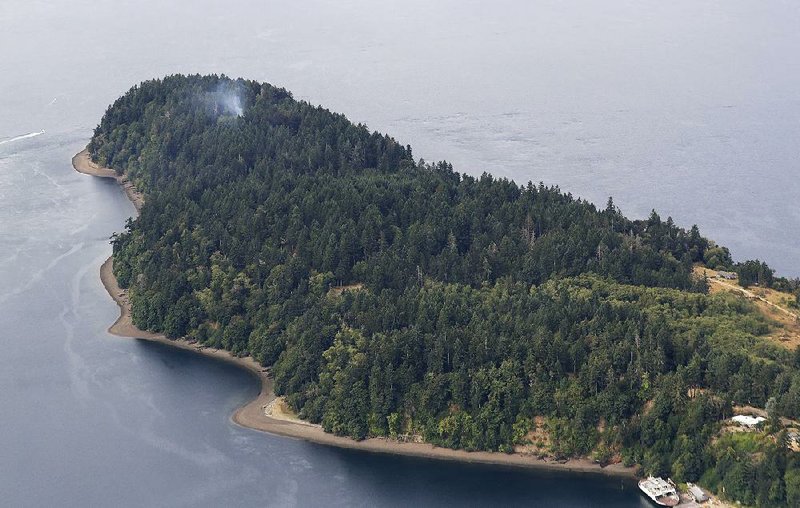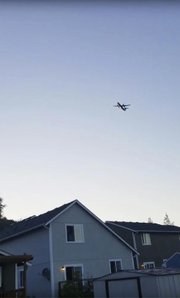OLYMPIA, Wash. -- Investigators went to an island in Puget Sound on Saturday to gather evidence from the site where a Horizon Air employee crashed a stolen turboprop passenger plane from Seattle-Tacoma International Airport.
No one died except the pilot, identified as Richard Russell. But the theft of a 76-seat turboprop commercial airplane from one of the U.S.' busiest airports has heightened worries about gaps in American aviation security, forcing questions about how a baggage handler and grounds crew member could fly loops and zigzags over a major metropolitan area.
Russell, a ground-service agent at the airport, took off at 7:32 p.m. Friday local time, delaying dozens of flights as the airport enforced a ground stop during the unauthorized flight.
The plane roared low over Puget Sound, southwest of Seattle, with a pair of Air Force F-15s from Portland, Ore., in pursuit. The F-15s were armed but did not fire on the aircraft, said Air Force Capt. Cameron Hillier, a spokesman for North American Aerospace Defense Command, which oversees airspace protection. Hillier declined to describe the circumstances in which the Air Force would fire a missile at a U.S. aircraft but said it would involve "a lot of collaboration" among pilots, commanders and others.
Air traffic controllers lost contact with the plane about 75 minutes after it took off.
There was no connection to terrorism, said Ed Troyer, a spokesman for the Pierce County sheriff's office.
Alaska Airlines said in a statement that no one else was believed to have been on board the aircraft, and officials confirmed the man who stole the plane was killed in a fiery crash about 30 miles from the airport. Horizon Air is part of Alaska Air Group and flies shorter routes throughout the U.S. West.
Troyer, posting late Friday on the sheriff's office's official Twitter account, said authorities had confirmed that Russell was "a suicidal male," later adding, "Confirmed info .. this is a single suicide male. We know who he is."
Debra Eckrote, the Western Pacific regional chief for the National Transportation Safety Board, said investigators will focus on recovering the voice-data and flight-data recorders from the wreckage. They also will work to recover the remains of the 29-year-old man.
"It is highly fragmented," Eckrote said of the plane. "The wings are off; the fuselage is, I think, kind of positioned upside down."
The crash sparked a 2-acre wildfire that "is pretty much out," Eckrote said Saturday.
The 221-acre Ketron Island, where the plane crashed, is populated by fewer than two dozen people. It's only accessible by ferry, and it remained closed to ferry traffic Saturday. The plane went down in an area covered with brush and trees, and no structures on the ground were damaged, Alaska Airlines said.
The FBI, the National Transportation Safety Board and Alaska Airlines are investigating.
Russell had worked for Horizon for 3½ years, and he had worked his shift Friday.
The stolen plane, which Alaska Airlines said was in a "maintenance position" and not scheduled for a passenger flight, was parked in an area called Cargo 1 on the north part of Seattle-Tacoma International Airport. Russell was responsible for handling luggage and cargo, so he possessed the security clearances needed to access the plane.
He was also responsible for towing aircraft, and he was able to rotate the plane 180 degrees on the tarmac before climbing into the cockpit, taxiing to a runway and taking off, Alaska Airlines executives said.
Brad Tilden, chief executive of Alaska Air Group, told reporters Saturday that the incident "is going to push us to learn from this tragedy and make sure this does not happen again at Alaska or any other airline."
But he and other airline executives declined to say what measures they could take to prevent someone with security badges from stealing another plane.
"The doors to the airplanes are not keyed like a car," he said.
TALKS WITH CONTROLLERS
Russell flew the plane around the Seattle-Tacoma area, chatting sometimes calmly and sometimes in a frenzied stream of consciousness with air traffic controllers who tried to guide him to a safe landing.
Recordings of Russell's conversation with air traffic controllers reveal that he was admiring the view of the Olympic Mountains at sunset and complaining of lightheadedness. A controller tried to persuade him to land the airplane.
"There is a runway just off to your right side in about a mile," the controller said, referring to an airfield at Joint Base Lewis-McChord.
"Oh, man. Those guys will rough me up if I try and land there," Russell responded, later adding: "I don't know, man. I don't know. I don't want to. I was kind of hoping that was gonna be it."
Russell also said, "This is probably jail time for life, huh? I would hope it is for a guy like me."
A controller replied, "Oh, Richard, we're not going to worry or think about that. But could you start a left turn please?"
Russell said he hoped to have a "moment of serenity" in the air but lamented that the sights "went by so fast."
"I got a lot of people that care about me, and it's gonna disappoint them to hear that I did this," he was heard saying. "I would like to apologize to each and every one of them. Just a broken guy, got a few screws loose, I guess. Never really knew it until now."
The F-15 pilots attempted to divert the aircraft toward the Pacific Ocean while maintaining radio communication with controllers and Russell. The jets flew close enough to make visual contact, Hillier said.
Videos taken by onlookers during Russell's flight showed the plane doing deep dives, broad loops and at least one upside-down roll.
Russell described his experience flying planes in video games and asked for the coordinates to an orca, commonly called a killer whale, that has been pushing her dead calf through Washington state's coastal waters for nearly three weeks.
"You know, the mama orca with the baby," he said. "I want to go see that guy."
Russell eventually told controllers that fuel was low and an engine was failing.
"I think I am going to try to do a barrel roll," Russell said. "And if that goes good, then I am going to go nose down and call it a night."
In a video that appears to have been posted by Russell in December, he introduced himself as a ground-service agent. "That means I lift a lot of bags," he said. "Like, a lot of bags. So many bags."
But "it allows me to do some pretty cool things, too," he added.
Most importantly, he concluded, "I get to visit those I love most."
Information for this article was contributed by Kenny Ocker and Alexis Krell of the News Tribune of Tacoma, Wash.; by Jacey Fortin and Christina Caron of The New York Times; by Alex Horton and Nick Miroff of The Washington Post; and by Rachel La Corte, Keith Ridler and Mike Balsamo of The Associated Press.
A Section on 08/12/2018


